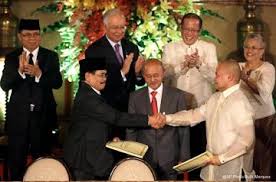Sant'Egidio announces peace in Mindanao

ROME-A 40-year conflict concludes with a peace pact between Islamic separatists and the government, promising an end to decades of inter-ethnic violence in Mindanao.
The Comprehensive Agreement on the Bangsamoro, signed Thursday at a ceremony in the presidential palace in Manila by the leader of the Moro Islamic Liberation Front (MILF), Murad Ebrahim, and President Benigno Aquino, comes as a result of peace negotiations spanning over 17 years, and mediated by Malaysia and the so-called Contact Group composed of four international organisations, including the Sant’Egidio Community.
“Sant’Egidio has been following the conflict for years,” said the president of the Community Marco Impagliazzo at the press conference held Thursday in Trastevere. “We believe in what Pope John Paul II called “the spirit of Assisi”, he continued, “collaboration of religions to bring peace in the world. It could not have been more relevant in the case of Mindanao, where religion was at the centre of the conflict.”
The long-lasting unrest in Mindanao, the second largest and southernmost island in the Philippines, has its roots in the redrawing of the borders in the aftermath of the Spanish conquest and the subsequent U.S. rule in the region, never accepted by the population of the area. The term “Bangasamoro” refers to its Muslim inhabitants who, at the time of the Spanish colonisation, were considered the indigenous people of the southern Philippines. In the 1980s autonomy was granted to the Mindanao region by the Philippine government, however, in 1996 the agreement between the two sides was rejected by a part of the Moro front, which had separated from the original rebel group in the 1970s and, under the name of MILF, continued an armed struggle for independence. Despite the cease-fire agreement in 2001, violence never stopped, claiming over the years the total number of 150.000 lives.
It was in the second half of 2000s when the Sant’Egidio Community got directly involved in the peace negotiations, joining forces with the local Church, under the leadership of Cardinal Quevedo, and the Islamic association Muhammaddiyah, another member of the Contact Group, with a series of meetings held with MILF representatives both in Rome and Indonesia.
“Italy is one of the major immigration destinations for Philippine citizens,” stressed Signor Impagliazzo. “It is only right that we take interest in their cause.” Sant’Egidio delegate Alberto Quattrucci, the general secretary of the Community, participated in the conclusive stages of the negotiations, and was in attendance at yesterday’s ceremony in Manila.
“It is the most inclusive agreement one could wish for in such a complex situation,” stated Dr Valeria Martano, Sant’Egidio Asia expert, present at Friday’s press conference. The terms of the Comprehensive Agreement oblige MILF to drop its separatist claims and to settle for a parliamentary self-rule in the Bangsamoro autonomous region, to be established by 2016. On top of that, MILF will gradually decommission its military forces (around 12.000 men) and will engage in what is referred to as “power sharing” with the Philipino government, which will, however, retain exclusive powers on matters of defence, foreign policy, currency and citizenship.
Teresa Deles, presidential adviser on the peace process, present at the signing of the pact in Manila, is optimistic: “After seventeen long years of difficult negotiations, it is the first time that a political solution is reached which could guarantee lasting peace and progress in Mindanao.”


